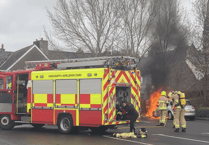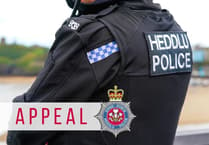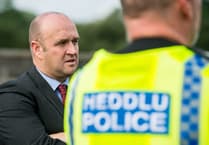A retired builder who fell onto a circular saw "scooped up his bowels" and wrapped them in a T-shirt before driving himself to a local community hospital for help.
Brendan Clancy had been cutting pallets in his garden on June 9 this year when he tripped and fell onto the nine-inch blade of the saw, which cut through his abdomen and through to his bowels.
Mr Clancy, of Upper Cwmtwrch, in the Swansea Valley, drove himself to Ystradgynlais Community Hospital 10 minutes away.
Community hospitals are not set up for this type of medical emergency, however, the staff took full control of the situation, giving him the best possible care while calling for further assistance. Wales Air Ambulance was dispatched soon after and flew to Mr Clancy at the hospital.
The 67-year-old said: “I had a four-foot stack of pallets that I was cutting through and somehow, I lost my footing and fell onto the saw.
“At first, I had fallen on the back of the saw, and I thought ‘that is going to hurt’, but then I felt something squidgy and I realised my bowels were coming out. I couldn’t believe it. They just kept coming out and it seemed as if it would never stop.
“There was a bucket on the floor but that was dirty, and I thought I couldn’t use that, so I went inside and grabbed a T-shirt and wrapped them up in that. I must have been running on adrenaline, I knew I needed help but knew I couldn’t wait for help to arrive.
“My wife was away in Carmarthen and my phone was in my pocket where my insides were spilling out. I drove myself to the minor injuries unit which is a few miles away in Ystradgynlais.
“I was making sure I was keeping my senses and concentrating on the road while driving. I have a manual car, and all my guts were all over the gear lever side, but it helped to take my mind off it. When you are carrying your guts, you don’t think of anything else apart from keeping them all in one place.
“There was no blood even though the saw had cut through about four inches of my bowel, but I could see my breakfast.
“When I got to hospital, two ladies were coming out and said they were just about to close. They looked down and saw my bowel bag and my innards being outwards and called me an ambulance.
“It was only when I was put on a trolley, I felt the rush of pain.”
Brendan was taken to nearby Pontardawe playing fields where the Wales Air Ambulance helicopter was waiting for him.
The father-of-five said: “Getting off the trolley on to the stretcher was painful, but the crew were excellent and so reassuring. They gave me pain relief and I remember the trees turning pinkish and the clouds not looking right.
“One of the medics would keep putting his thumb up to me and I’d do the same back. Within 15 minutes we were at the University Hospital of Wales in Cardiff.”
Brendan went straight into the operating theatre and underwent four hours of surgery, before returning home only a few days later.
When reflecting on the care he received, Brendan said: “I could not fault the Wales Air Ambulance; they were all absolutely fantastic. I have lived all over the world and to my mind there is no other service in this world that could better it.

“I am glad I could share my story and raise the profile of the Charity. I appreciate how incredibly lucky I am to be alive and how lucky we are to have such an amazing service in this country. I want to thank everyone who helped me on the day of my accident.
“I have nothing but praise for the people who looked after me.”
The Wales Air Ambulance relies entirely on public donations to raise £11.2 million every year to keep its four helicopters in the air and fleet of rapid response vehicles on the road.
The Service offers advanced critical care and is delivered via a unique Third Sector and Public Sector partnership between the Wales Air Ambulance Charity and the Emergency Medical Retrieval and Transfer Service (EMRTS Cymru).
Wales Air Ambulance is consultant-led, taking hospital-standard treatments to the patient. This includes the ability to administer anaesthesia, deliver blood transfusions and conduct minor operations, all at the scene of an incident. The Service is often described as a ‘flying emergency department’.
Professor David Lockey, EMRTS Director, was the critical care consultant who attended Mr Clancy, alongside Critical Care Practitioner, Tom Archer.
He said: “It’s good to hear he has made such a speedy recovery. It is important to acknowledge the role of our colleagues in Ystradgynlais Community Hospital in this positive outcome, alongside clinicians in the University of Wales, Cardiff.
“Despite the positive outcome in this case, we would still advise anybody in an emergency situation to call 999 directly. It also serves as a reminder to everyone to be careful with power tools.”
Brendan has made a full recovery with no lasting injury, other than a 12-inch scar.




